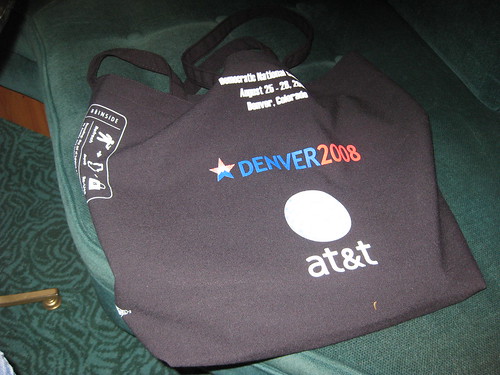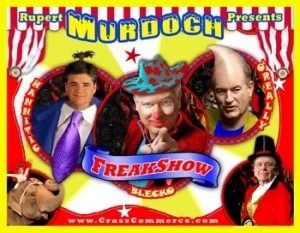I’m never sure if I should declare myself a Democrat once and for all, or if I should continue to sit on the fence, occasionally dabbling in left wing politics, lending my support to emerging populist movements like the Pendejo Luminoso.
Today, on techPresident, Micah Sifry used that High-Marketing-Contrived phrase “World Live Web.” Micah intends to sit out the conventions in front of his flat screens, following the action via the net.
What action? You have to go back to 1952 and 1956 to glimpse even a hint of reality transcending the scripted pageants that our national conventions have become.
I’m staying home too, but I’ll be reading two-four and The House of Wigs, not trying to divine meaning from the pixelated entrails spread on the glowing altars by the main-stream media priesthood or the shamans of the web. I don’t care how close to real time the acts are performed. I’d rather catch them at the Rivoli than live in a venue named after a soft drink or mediated through electronic transmissions.
Micah points to Marc Cooper who avers that there is some kind of connection between America’s corporations and the political conventions. Shocking, I find that shocking!
More heartening I think is this observation from Dana Goldstein and Ezra Klein at the American Prospect:
When Hillary Clinton conceded the nomination, Obama’s first major [DNC] staff change was not the incorporation of a former Clinton operative meant to heal the divisions of the primary, nor the elevation of a national-security graybeard meant to reassure general-election voters of Obama’s commander-in-chief credentials. Rather, it was to install Paul Tewes, the skilled organizer who served as the architect of Obama’s crucial victory in Iowa, at the DNC to head up the committee’s election-year efforts. A few weeks later, it was announced that the DNC would cease accepting contributions from lobbyists or political action committees.
Then it came out that much of the DNC was moving to Chicago. In the months that have followed, the Obama campaign has announced plans for training camps that will turn out thousands of new organizers dedicated to electing Democrats, and has signaled that it will spend millions in blood-red states where Democrats haven’t seriously invested in building party infrastructure for decades. The campaign has constructed a fundraising machine based around small-donors that promises to end the age-old competition for dollars between different wings of the Democratic establishment, enabling the creation of a unified electoral strategy. It has argued that “real change” requires the sort of legislative successes that only a strong congressional party can produce. In short, the candidate running on his exhaustion with traditional party politics has directed his campaign to build a new kind of Democratic Party–one that may put to shame anything that came before it.
AT&T may have grabbed the coveted logo space on the convention schwag bag, but President Obama is going to owe them less than any of his predecessors since Harry Truman.

Pic by Dave Winer via FlickR
{ Comments on this entry are closed }

